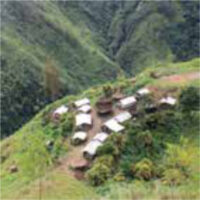Main content
‘My little son has a fever and we will be travelling tomorrow, what shall we do?’ January, 2020, a colleague was returning from abroad to Papua, Indonesia. Something was going on in China, and airport authorities in Thailand started doing prior temperature checks on travellers as part of boarding procedures. Wasn’t this just a kind of flu, not too severe? ‘Don’t worry, just give him some paracetamol so that you can pass that temperature check. They are just a little nervous there.’

A month later this “mild flu” apparently was something more serious. More and more deaths were reported and suddenly two brand new hospitals were built in China. Indonesia has quite strong ties with China, including daily flights to Wuhan, so I expected to hear very soon about cases of this new illness. All countries in Southeast Asia reported rapidly rising numbers, but not Indonesia. Instead, the government invested millions of dollars to advertise Indonesia as a corona-free country: ‘Come for holidays to Bali!’
Late February, one of my patients was evacuated from Papua to Jakarta for surgery. He was admitted to one of the best hospitals in Indonesia, which was apparently filled with dengue patients. He got a mattress on the floor. The strange thing was that these patients were coughing persistently; some looked really sick and disappeared secretly during the night. He got his surgery and finally a normal bed on a surgical ward. After a few days, he developed fever and started having a sore throat and a dry cough. What to do? I advised him to ask for a Covid test. His doctor was startled: ‘We don’t have that illness in Indonesia, and you didn’t come from abroad. Furthermore, your blood tests and X-ray were totally fine on admission. No need to test. Your wound might be infected, so I will start antibiotics.’ The only thing I could do was to strongly advise self-quarantine after he got back in our little Papuan town. The wounds looked perfectly clean and healing, but the fever persisted for a week. Early March, the first Covid-19 cases were reported. But that was in Jakarta, not on our island, far away to the east of Java. Strangely enough, our expat medical team got more and more questions about people who were coughing with fever and shortness of breath. Really healthy people suddenly got sick – sicker than they ever had been before. An interior village reported that all of the villagers became ill after they had received visitors from Jakarta, and two people died. In the meantime, messages from all over the world came in, from Italy, Iran, and the Netherlands. There were not so many cases in the United States of America (USA) yet. It was interesting to see how we as expats reacted differently to this illness in Papua. I heard messages about the rapid spreading of Covid-19 in the Netherlands and elsewhere in Europe and was advising people who had travelled, especially expats, to go into quarantine so they would not spread the virus to vulnerable people. American doctors and nurses were more laid-back. In the USA it was not a big deal, so why would it be a problem in Indonesia? But it did become a big deal. New cases and deaths rose steeply. Jakarta and other parts of Indonesia went into local self-imposed lockdowns, also in Papua. As a family we had to travel to renew our visa; these plans, however, got thwarted as other countries closed their borders. After a quick Jakarta-Kuala Lumpur-Jakarta trip, we got stuck in Jakarta without a work permit and our kids had fever and a cough. After six years in Indonesia we were suddenly forced to go back to the Netherlands. What we can still do is give advice and moral support to friends and colleagues in interior Papua, and send them patterns for batik-masks, templates to 3D print face shields, and money to make that possible.


















































